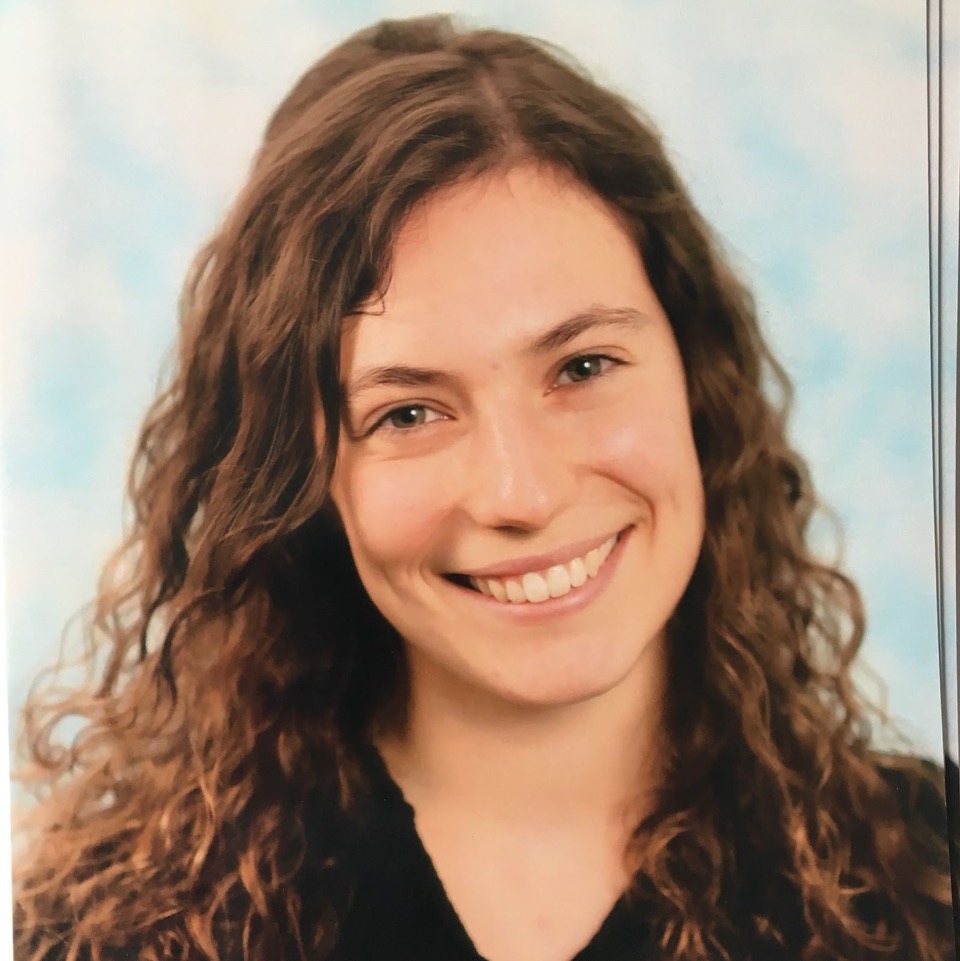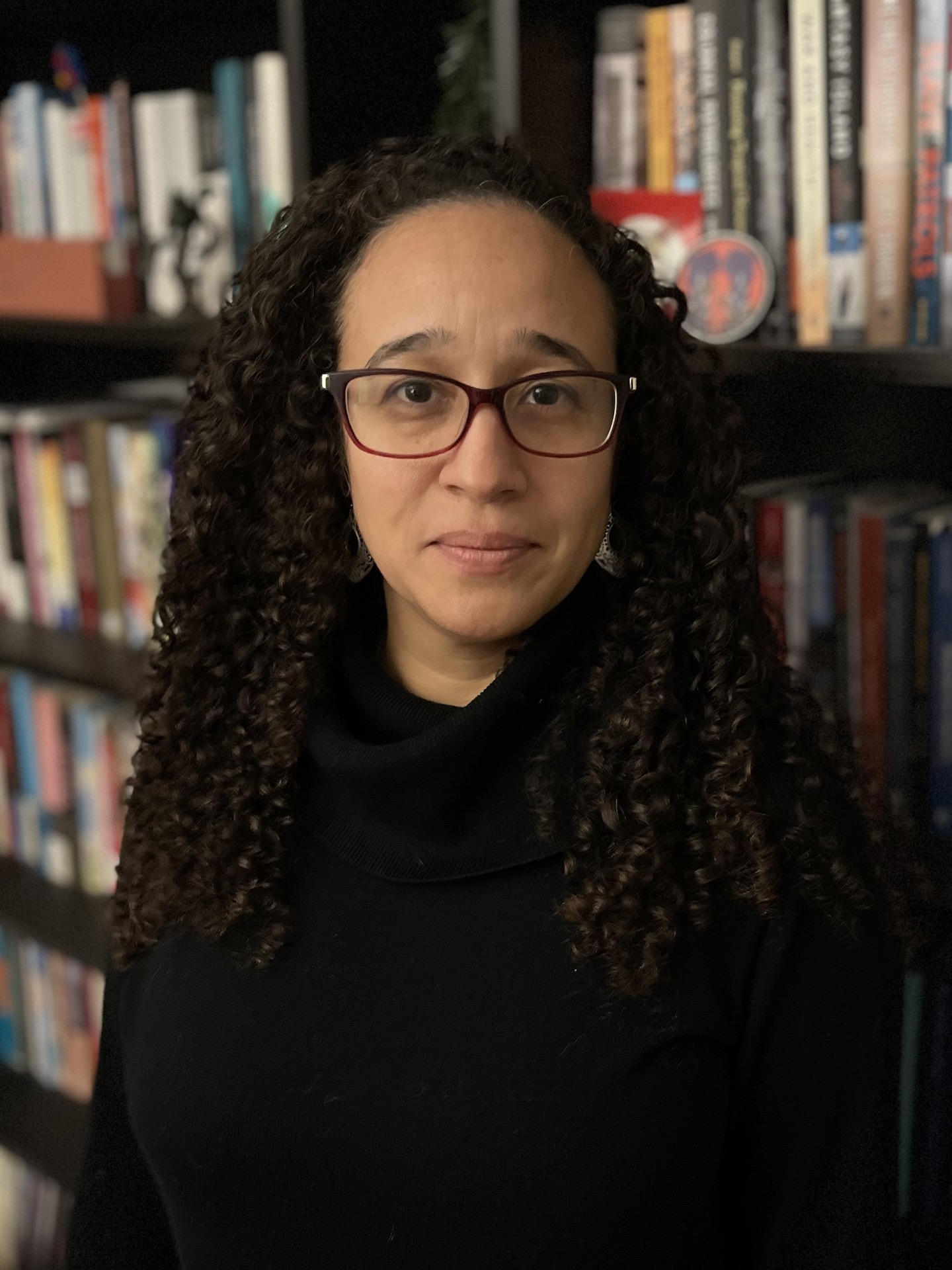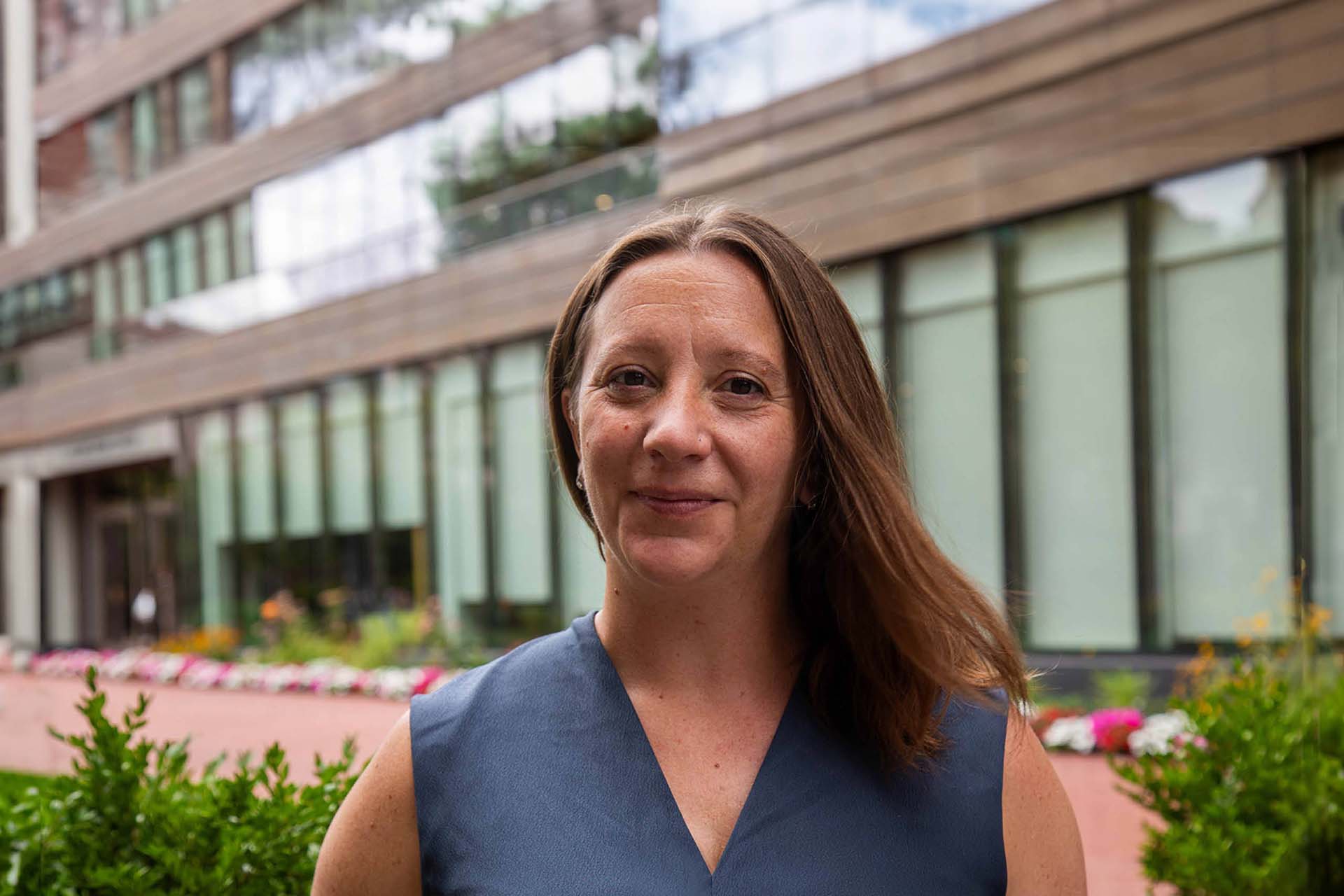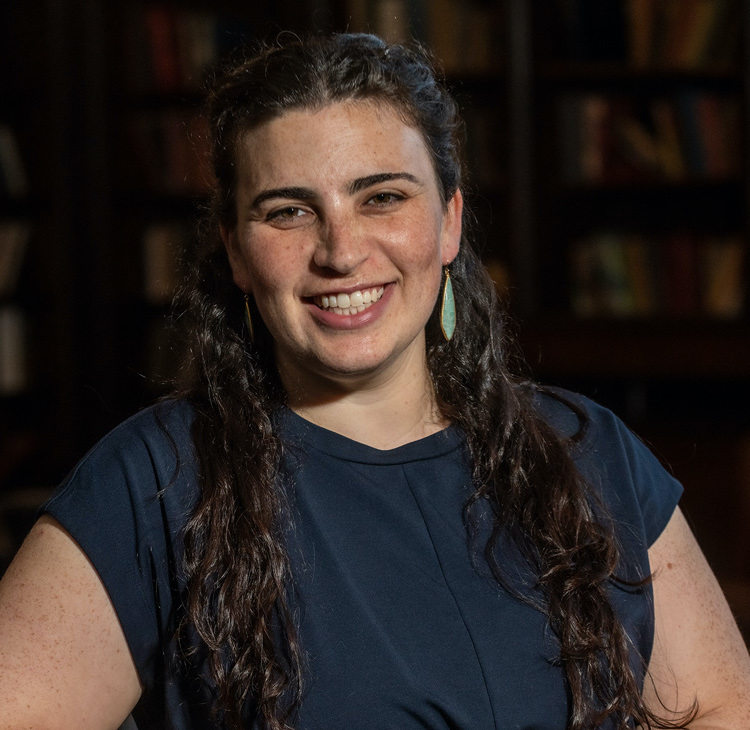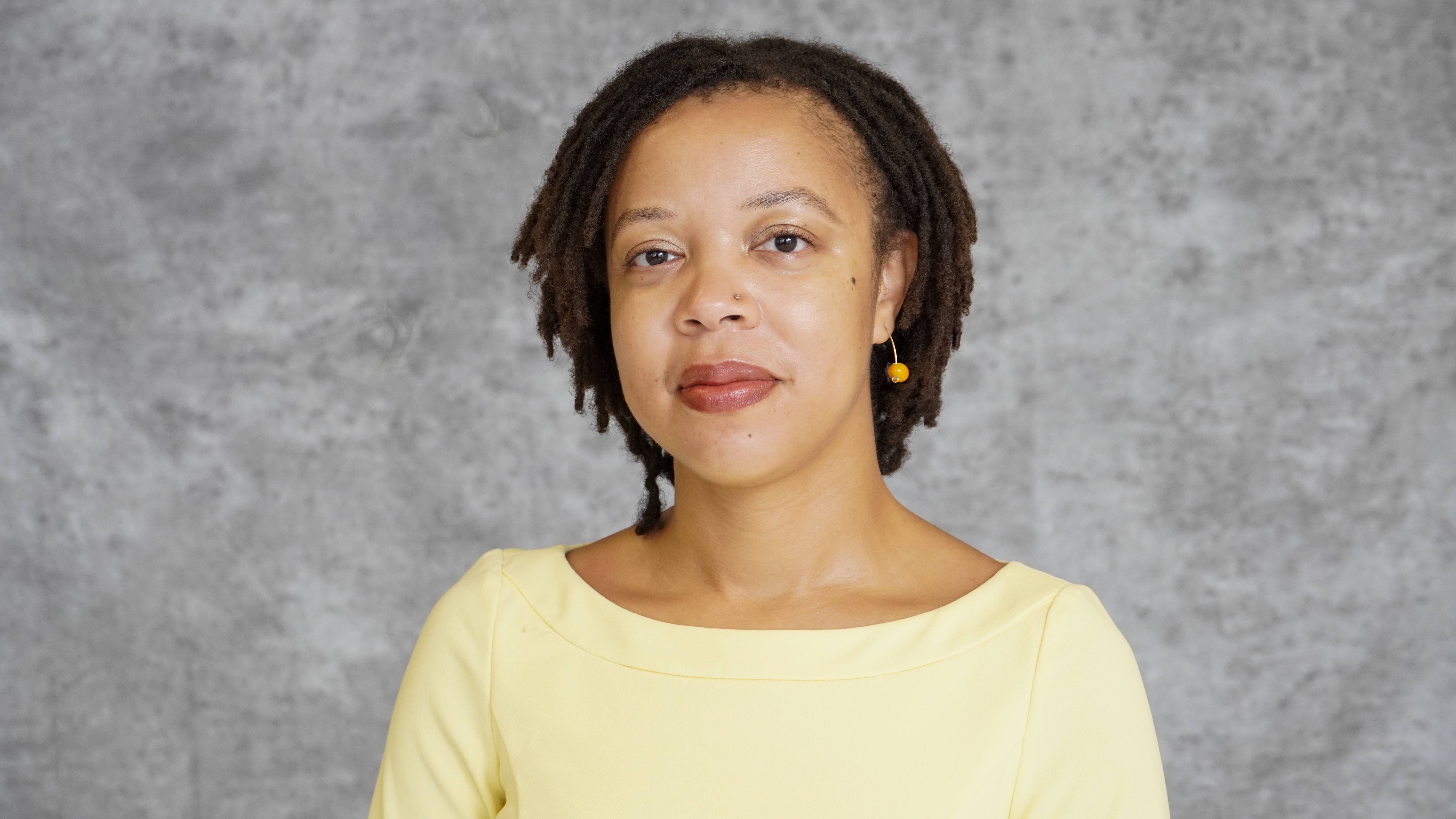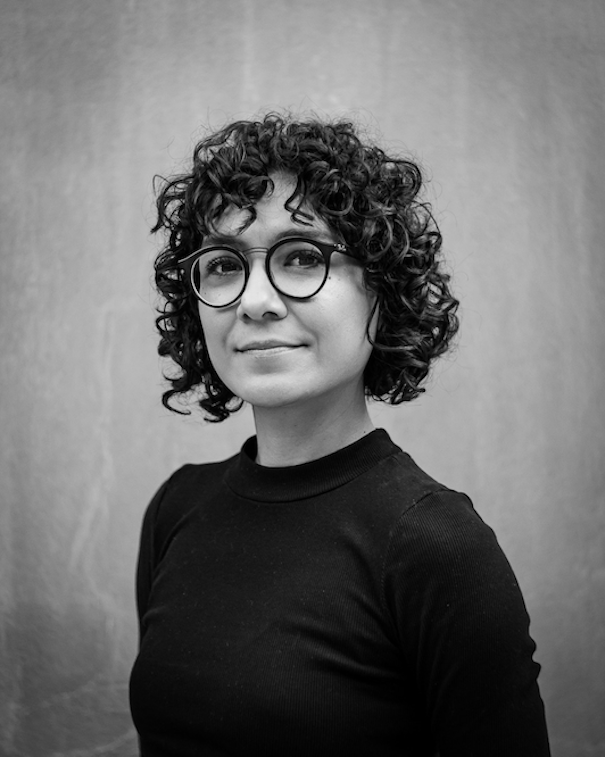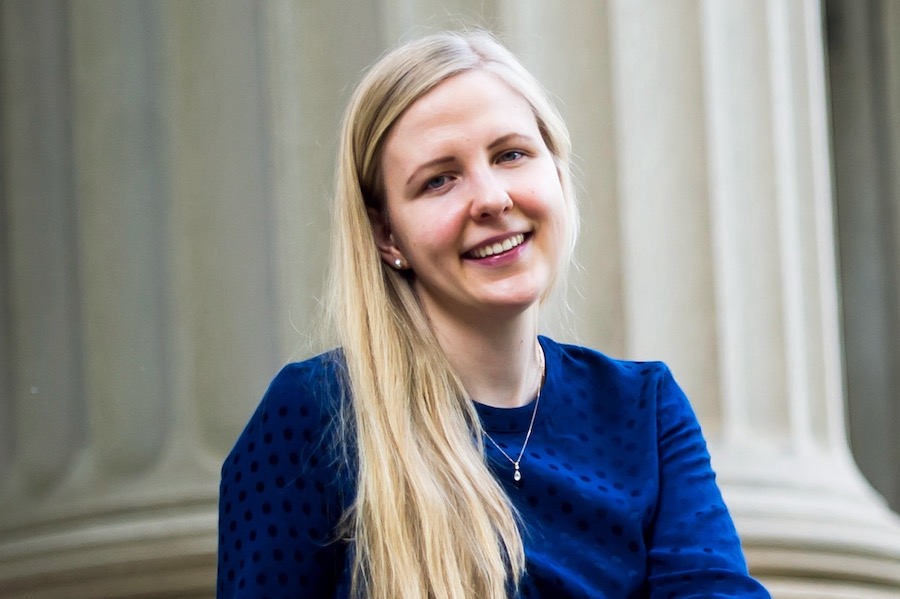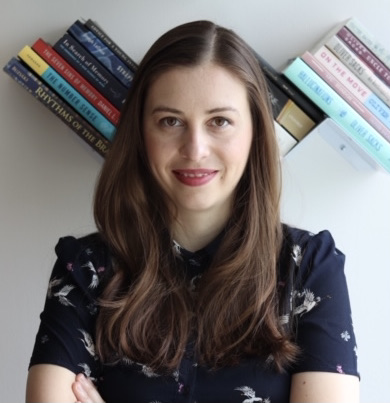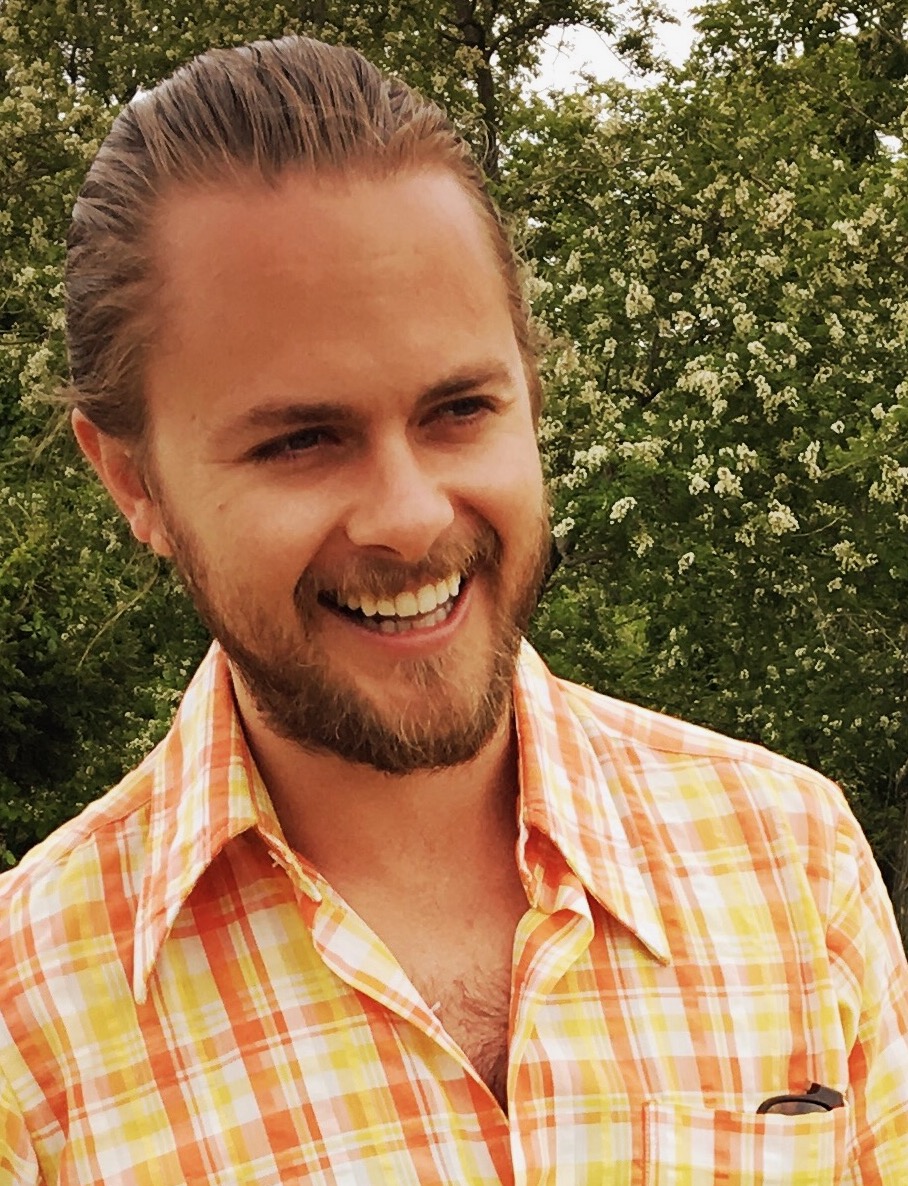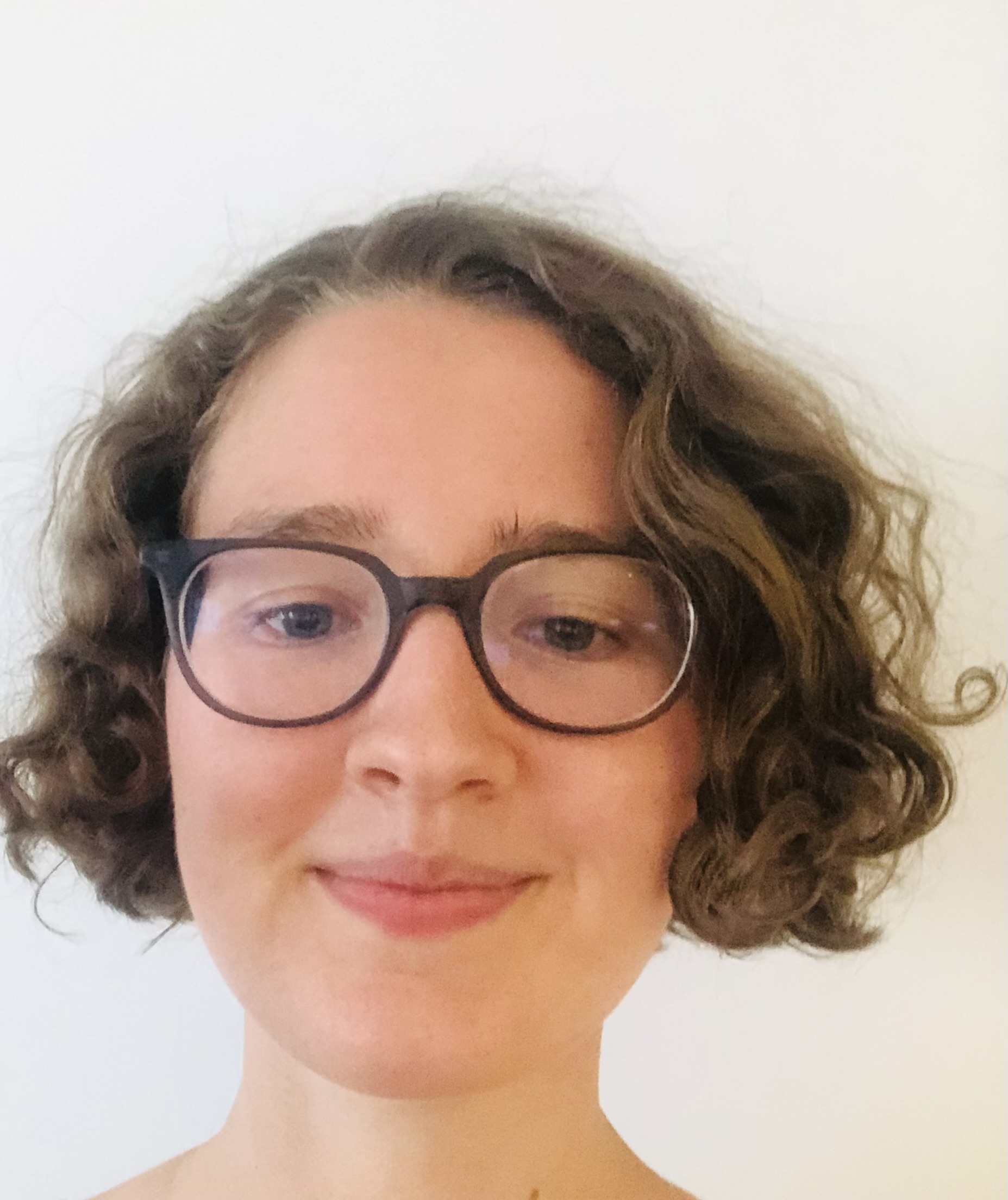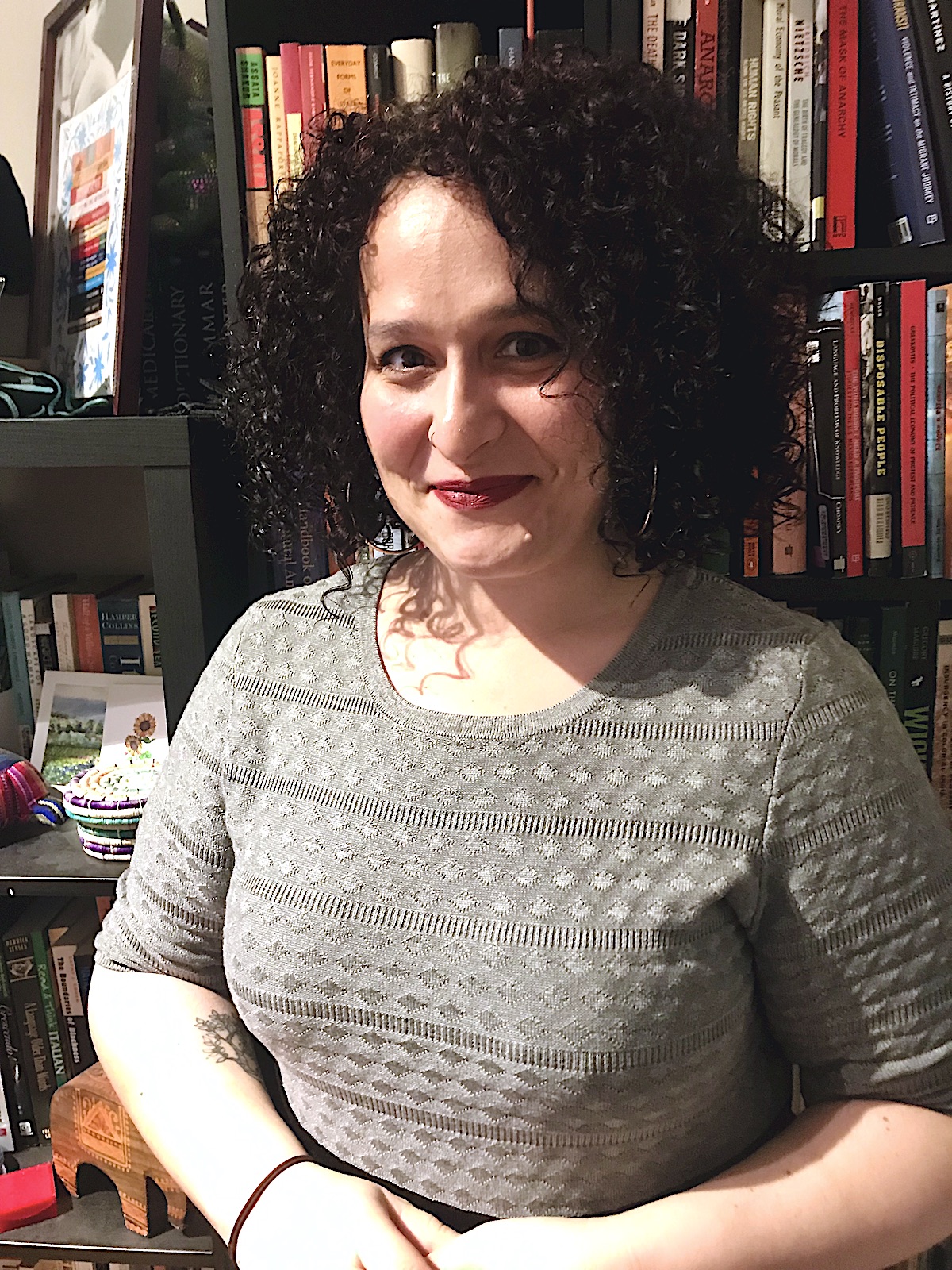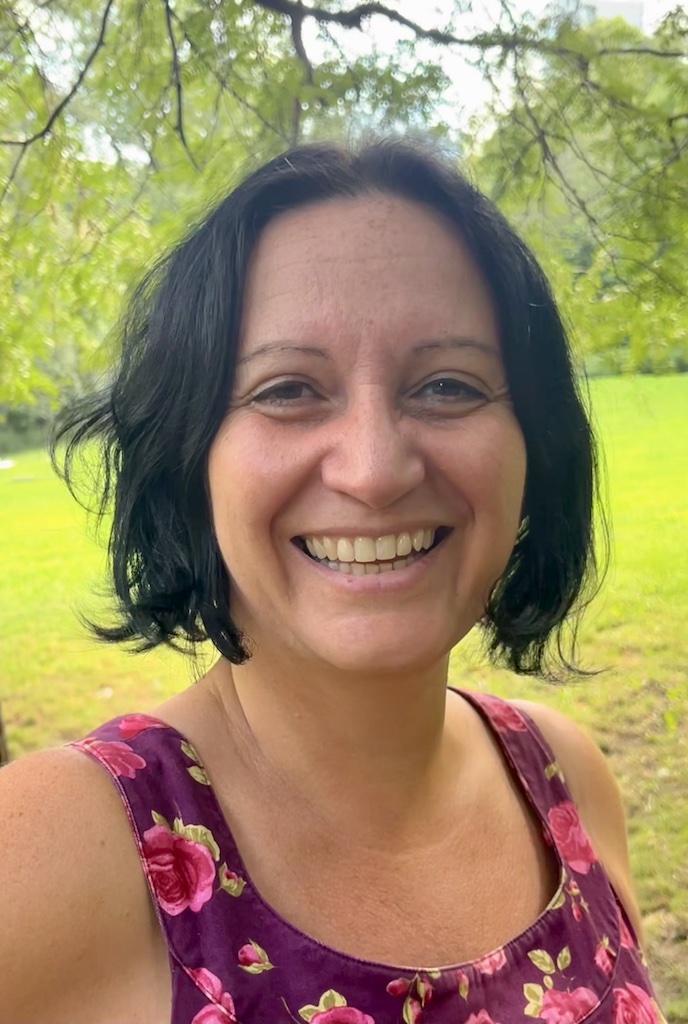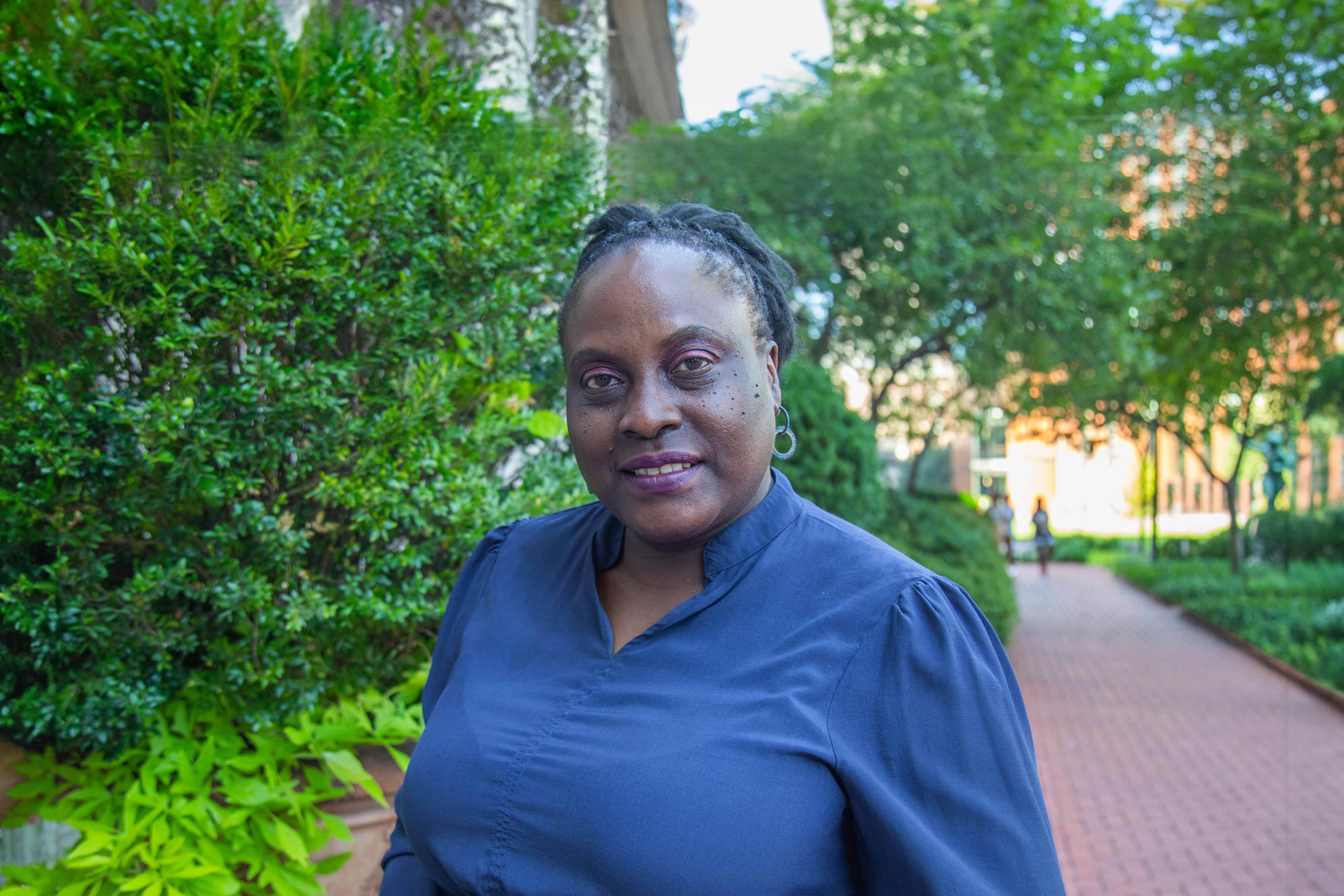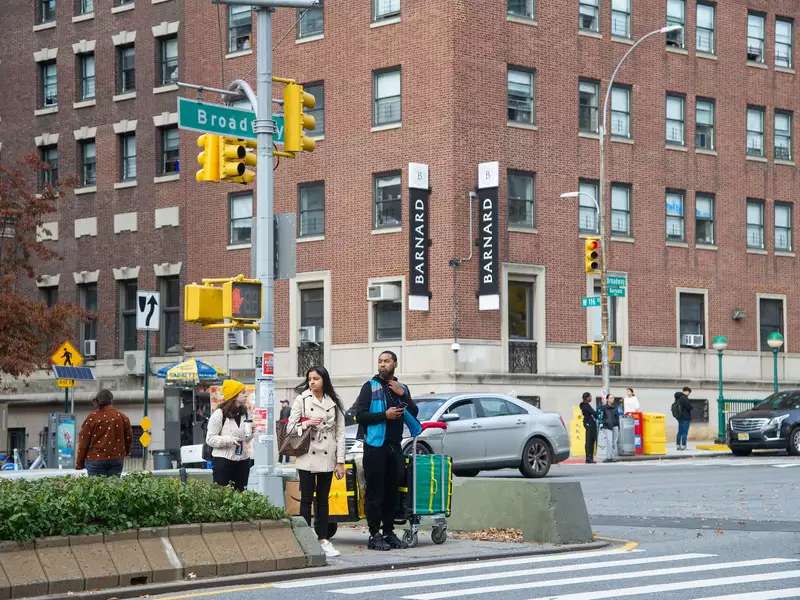Barnard welcomes faculty members to campus in new appointments every fall semester to uplift the College’s mission of providing young women with a world-class education across the arts and sciences.
For the 2023-2024 academic year, experts will join departments from Africana studies to neuroscience and behavior. Meet the 24 scholars arriving on campus this fall, below.
Assistant Professors
Emily Black, Computer Science
Emily Black is an assistant professor of computer science who studies fairness and accountability in AI systems. Her work centers around creating methods to determine whether AI systems will cause various types of harm to the public, studying the equity impacts of AI systems in high-stakes settings — such as the government — and connecting her own and related research to the legal and policy worlds to help better regulate AI systems.
Black’s work is necessarily interdisciplinary as she aims to prevent harm from AI systems used in a variety of contexts — she works with lawyers, accountants, and civil society advocates to prevent algorithmic harm in practice. Recently, Black has been developing tools for discovering and mitigating unfairness along the model development pipeline. She has been collaborating with Stanford University and the IRS to understand the impacts that using machine learning algorithms for tax audit selection may have on the equitable treatment of taxpayers across income brackets. Black has been working with legal scholars and tech policy experts to show how technical work surrounding model multiplicity has impacts on anti-discrimination law.
Prior to joining Barnard, Black was a postdoctoral scholar at Stanford's RegLab, working with Daniel E. Ho. She holds a Ph.D. in computer science from Carnegie Mellon University, advised by Matt Fredrikson, and a B.A. from Wesleyan University.
Corey Toler-Franklin, Computer Science
Corey Toler-Franklin is an assistant professor of computer science who will direct the Graphics Imaging and Light Measurement Laboratory. She holds an affiliate position at the American Museum of Natural History.
Toler-Franklin’s research in computer graphics and vision develops algorithms that use mathematical principles in optics to capture and analyze the shape and appearance of complex materials. Her data acquisition systems have been deployed in real-world settings for multispectral analysis of biological specimens and to reconstruct archaeological artifacts. Her recent work develops AI algorithms for biomedical research.
Collaborating with experts in oncology, pathology, and neuroscience, Toler-Franklin develops deep learning algorithms for diagnosing metastatic cancers and studying behaviors associated with neurological disorders (Alzheimer’s, autism, depression). Her recently co-authored publication, “Multiscale Detection of Cancerous Tissue in High Resolution Slide Scans,” introduced an algorithm that extends the effective receptive field of a convolutional neural network for multiscale detection of cancerous tumors.
Prior to joining the faculty at Barnard, Toler-Franklin was an assistant professor of computer science at the University of Florida. Toler-Franklin was a UC President’s Postdoctoral Fellow at UC Davis and a research affiliate at the UC Berkeley CITRIS Banatao Institute. She has also held industry positions at Autodesk, Adobe, and Google. She holds a Ph.D. in computer science from Princeton University, an M.S. degree from the Cornell University Program of Computer Graphics, and a B. Arch. degree from the Cornell University College of Architecture, Art, and Planning.
Lisa Jahn, American Studies
Lisa Jahn is a cultural anthropologist whose research combines ethnographic methods with feminist scholarship and critical social theory on racialization, gendered care work, and coloniality. Her work looks at how coloniality persists and defies geographical boundaries to shape life in diasporic communities at the intersection of colonialism and anti-Blackness. Her current research focuses on how Puerto Ricans displaced to New York City post-Hurricane María navigate and adapt to bureaucratic neglect and structural violence. In the absence of adequate state support, Puerto Rican and Dominican women were employed as disaster case managers — the first point of contact — engaged in gendered care work to create alternative forms of recovery. Jahn will teach courses on Latinx/a/o New York, feminist ethnography, and American studies.
She has co-authored numerous articles as part of the Findings Collective in Anthropology Now. She is co-author of a white paper for the NYC Department of Health and Mental Hygiene on Sexual and Reproductive Justice and Community Engagement.
Prior to joining Barnard, Jahn was an adjunct professor at Brooklyn College, CUNY, for seven years while completing her dissertation, “Gendered Care Work and State Ambivalence: Disaster Recovery and Puerto Rican Displacement in New York City,” at the CUNY Graduate Center, where she received her Ph.D. in anthropology. She received her B.A. in medical anthropology and Puerto Rican studies from the CUNY Baccalaureate for Unique and Interdisciplinary Studies.
Michelle Greene, Psychology
Michelle Greene (they/she) is a cognitive psychologist specializing in high-level visual perception. Greene’s primary research goal is to understand the mechanisms enabling rapid, intelligent environmental perception. Toward this end, they use machine learning and computer vision methods to model the information the human brain may use for visual understanding.
In 2019, Greene led a team from three universities to create the Visual Experience Database, one of the largest and most representative egocentric video databases of daily activities, complete with gaze tracking to understand attentional deployment in the real world. She recently received an NSF CAREER Award to examine the efficient coding of visual, structural, and semantic scene information.
Prior to joining Barnard, Greene was a faculty member at Bates College (2017-2023) and Minerva Schools at KGI (2015-2016). She received her B.S. in psychobiology from the University of Southern California and her Ph.D. in cognitive science from MIT, with additional postdoctoral training at Harvard Medical School and Stanford University’s AI Lab.
Nora Gross, Education
Nora Gross is a sociologist of education, an ethnographer, and a documentary filmmaker. Her research explores the intersection of race, gender, and class for youth, in both school and community contexts, and asks how young people develop and protect their inner lives in the face of considerable external constraints.
In her forthcoming book, Brothers in Grief (University of Chicago Press, expected 2024), Gross spotlights the emotional aftermath of neighborhood gun violence for young people and its consequences for educational equity, by telling the story of the institutional management of grief at a Philadelphia high school where Black male students shouldered the deaths of multiple friends. She also co-edited a methods text entitled Care-Based Methodologies: Reimagining Qualitative Research with Youth in U.S. Schools, which offers concrete advice for conducting school-based research grounded in care.
Prior to joining Barnard, Gross was a Core Fellow and visiting assistant professor of sociology at Boston College, where she worked on interdisciplinary teaching teams in the first-year core curriculum. She received her Ph.D. in sociology and education from the University of Pennsylvania in 2020, an M.A. in sociology of education from NYU, a graduate certificate in documentary media studies from The New School, and a B.A. in art history and African American studies from Princeton University. Gross was also the founding director of a high school writing center on the West Side of Chicago.
Amelia Simone Herbert, Education and Urban Studies
Amelia Simone Herbert is an assistant professor of education and urban studies at Barnard. Her research and teaching draw on anthropology, comparative education, and Black studies to interrogate the roles that education plays in the construction and subversion of racialized urban inequality.
Her current book project is an ethnography that examines how youth, families, and educators navigate the racial and spatial politics of aspiration in the increasingly marketized schooling landscape of Cape Town, South Africa. In spring 2024, she will be a Scholar-in-Residence at the Schomburg Center for Research in Black Culture of the New York Public Library.
Prior to joining Barnard College, Herbert was a postdoctoral fellow at Rutgers University’s Institute for the Study of Global Racial Justice and visiting assistant professor in Colgate University’s Department of Educational Studies. She received her B.A. in history from Duke University and her M.A. and Ph.D. (anthropology and education) from Teachers College, Columbia University.
Maricarmen Hernández, Sociology and Urban Studies
Maricarmen Hernández is an environmental and political sociologist. Her work investigates the production of environmental inequalities as reflected in the uneven distribution of environmental harms and privileges. Focusing on daily practices of placemaking and interpretations of risk, she studies the processes that confine communities to hazardous living spaces. Using primarily ethnographic, qualitative, and archival methods, Hernández’s main areas of research are environmental inequality, urban marginality, political sociology, and studies of Latin America and Latinx communities. Her current research project is an ethnography of contaminated informal neighborhoods in the majority Afrodescendent city of Esmeraldas, Ecuador.
Prior to joining Barnard, she was assistant professor of sociology at the University of New Mexico. She has also held visiting positions at Facultad Latinoamericana de Ciencias Sociales Quito and at the Universidad Luis Vargas Torres-Esmeraldas.
Alisa Knizel, Mathematics
Alisa Knizel’s research focuses on the interplay between probabilistic and algebraic properties of lattice models in statistical mechanics. Her most recent work is related to random matrix theory and interacting particle systems, with applications to random growth models, traffic models, and combinatorics. Before joining the Barnard faculty, she was an assistant professor in the University of Chicago’s statistics department. Prior to that, Knizel was an NSF postdoctoral fellow in the mathematics department of Columbia University. She received her Ph.D. in mathematics from MIT in 2017.
Emlyn Resetarits, Biology
Emlyn Resetarits is a disease ecologist who focuses on putting parasites into a community and ecosystem context. She studies parasite communities across multiple scales of organization, from host individuals and host populations to entire ecosystems. By combining field surveys, dissections, mesocosms, and lab and field experimentation, her research provides insight into host-parasite interactions, behavioral ecology, and community ecology. Her current work investigates geographic variation in the Eastern mudsnail and its trematode parasites.
Prior to joining Barnard, Resetarits was the scientist-in-residence at the University of Georgia’s Marine Institute on Sapelo Island and a postdoctoral research and teaching associate at the Center for the Ecology of Infectious Disease at the Odum School of Ecology at UGA. She received her B.A. in environmental biology from Columbia University and Ph.D. in ecology, evolution, and behavior from the University of Texas at Austin.
Lecturers
Mélanie Heydari, French
Mélanie Heydari teaches French and world literature, with a focus on postcolonial literature and women’s literature from the Middle East. She is currently working on a book project entitled Vikram Seth’s Poetics of Pastiche.
In 2012, while a visiting scholar at Transitions, an NYU-CNRS joint center for interdisciplinary research in the humanities, she received her Ph.D. in postcolonial literature from Sorbonne University in Paris.
Term Faculty
Anamaria Alexandrescu, Assistant Professor of Neuroscience and Behavior
Anamaria Alexandrescu is an interdisciplinary neuroscientist with a keen interest in bridging cognitive science research with educational methodologies. At Barnard, she teaches statistics and experimental design and lab in neuroscience and behavior. Currently, her research interests are at the confluence of neuroscience, cognitive psychology, and pedagogy. Prior to joining Barnard in 2023, Alexandrescu was a Postdoctoral Teaching Fellow in the College Core Curriculum Department at New York University, and she has taught over 25 neuroscience courses to undergraduate and high school students at NYU, Columbia, Fordham, and Yeshiva universities.
She received an A.A. from Broward College, a B.S. in neuroscience and behavior from Florida Atlantic University, and a Ph.D. in neuroscience and physiology from NYU. In her doctoral work, she examined the neurobiology of learning and memory, focusing on the molecular mechanisms that contribute to synaptic plasticity underlying long-term memory formation.
Andrew Anastasi, Assistant Professor of Sociology
Andrew Anastasi is a term assistant professor of sociology at Barnard, where he teaches courses on social movements, race, ethnicity, education, theory, and activism. He also teaches in Barnard’s First-Year Experience program and serves as an affiliate faculty member of the Institute for Comparative Literature and Society at Columbia University.
Trained as an historical sociologist and critical theorist, Anastasi studies the relationship between social movements and capitalist states. His current book project, Close-Quarters Antagonism: The New Left Within and Against the War on Poverty, draws from archival research to explain how grassroots organizations, such as the Black Panther Party, responded to federal anti-poverty initiatives in the U.S. during the 1960s and 1970s. Anastasi’s scholarship has appeared in Theory and Society, Journal of Historical Sociology, Critical Sociology, Black Perspectives, and other publications. His first book, The Weapon of Organization: Mario Tronti’s Political Revolution in Marxism, introduced Italy’s most influential postwar theorist of capitalism and the workers’ movement to Anglophone audiences. Anastasi has held research residencies at the New York Public Library’s Schomburg Center for Research in Black Culture and in Italy, at the University of Bologna’s Department of the Arts.
Before joining Barnard’s faculty, he taught at Fordham University, Queens College, and in public high schools across Washington, D.C. Anastasi earned a Ph.D. in sociology and a certificate in critical theory from The Graduate Center, CUNY, in 2022. He also holds a B.A. in media and cultural studies from Macalester College.
Dorota Biczel, Assistant Professor of Art History
Dorota Biczel is an art historian of global contemporary art who investigates experimental artistic practices vis-à-vis identity politics, issues of public space and the public sphere, and political transformations in the regions that can be considered postcolonial. Her book manuscript, Subjects Not Objects: Art, Migrations, and Political Transitions in Peru, 1968–1990, examines three generations of artists who combined strategies of transnational conceptual art with local Indigenous and popular practices to forge new political subjects for the changing country. On the one hand, her study traces key antecedents to contemporary social practice art. On the other, it shows that these experimental practices did not just intervene in social and art institutions but sought to remake the very idea of what it meant to be Peruvian.
Biczel is also an active curator. Her recent exhibitions include “Beyond the Record” at Houston Center for Photography (2022), where she also served as the executive director, and Mercosur Biennial 12 in Porto Alegre, Brazil (2020). Biczel teaches courses on contemporary art and seminars on issues of gender and sexuality and anti-, post-, and decolonial theories in the contemporary Americas.
She was a postdoctoral fellow in art history and ecology at University of Nebraska–Lincoln and a visiting assistant professor at the University of Houston. She holds a dual M.A. in art history and arts administration and policy from the School of the Art Institute of Chicago and a Ph.D. in art history from the University of Texas at Austin.
Fei Bu, Assistant Professor of Chemistry
Fei Bu is an inorganic chemist with a focus on the synthesis and characterization of organic porous metal materials. His paper “Two Zeolite-Type Frameworks in One MOF with Zn24@Zn104 Cube-in-Sodalite Architecture” explores the construction of new kinds of organic-inorganic hybrid porous materials for gas adsorption.
Prior to joining Barnard, Bu was a visiting assistant professor at Centenary College of Louisiana.
He received his B.S. in materials science and engineering from Nanjing University of Aeronautics and Astronautics and an M.S. in chemistry from Nanjing University. Bu earned his Ph.D. in chemistry from the University of California, Riverside.
Jenna Davis, Associate Professor of Urban Studies
Jenna Davis is an urban planner whose research interests include housing and zoning policy. At Barnard, Davis teaches classes on the built environment, housing policy, and research methods. Her research investigates how zoning regulations shape urban development and impact housing inequalities in the United States. She also investigates the political economy of zoning reform. In her scholarly work, she uses mixed methods, employing econometric and spatial analysis approaches, as well as leveraging qualitative methods, such as interviews and discourse analysis. Her work has previously been published in the Journal of Urban Affairs, the Journal of the American Planning Association, and Land Use Policy.
Davis previously served as a senior policy analyst at the Institute for Children, Poverty, and Homelessness, where she conducted research on the educational outcomes of homeless students in the New York City public school system. Davis also worked at the Citizens Budget Commission, performing research on property tax reform in New York City, and worked in marketing and operations at a real estate technology startup.
She is currently completing her dissertation in urban planning at Columbia’s Graduate School of Architecture, Planning and Preservation. She holds an MRP in regional planning from the University of Massachusetts Amherst and a B.A. in urban studies from Barnard.
Danielle Therese Dougé, Assistant Professor of Film Studies
Danielle Therese Dougé is a Haitian-American filmmaker from Chicago. Her work centers on the exploration of Black womanhood and feminisms, queerness, ancestral knowledge, and intergenerational trauma, via the genres of magical realism, thriller, horror, and drama.
Dougé’s recent work includes the narrative shorts She Came Back (2020) and Summertime Pie (2024). Dougé’s producing work includes the short films Everything’s Fine (2019), Pair (2023), 25 Frames (2023), Triangle of Perfection (2023), and Victorine (2024).
Dougé holds a B.A. in radio, television, and film from Northwestern University and an MFA in film, with a concentration in screenwriting, from Columbia University School of the Arts film program. While at Columbia, Dougé was awarded the Jesse Thompkins III Memorial Award for screenwriting. She was a 2020 Sundance Blackhouse Fellow and a 2021 Facebook SEEN Fellow. Most recently, Dougé was awarded faculty honors for her feature script, Summertime Pie, at the 2023 Columbia Film Festival. Dougé is currently a teaching artist at Developing Artists.
Amelia Frank-Vitale, Term Assistant Professor of Human Rights
Amelia Frank-Vitale is an anthropologist of migration, deportation, and violence in Mexico and Central America. Her current book project examines how young Honduran men navigate life after deportation, illuminating the changing nature of deportation in an era of border externalization and connecting regimes of mobility control — along with the creative ways people challenge them — across scale and space.
Her work has been published in Geopolitics, The Journal of Latin American and Caribbean Anthropology, EntreDiversidades, Public Anthropologist, and Trends in Organized Crime. Her commentary has appeared in The Washington Post, Fortune, NACLA Report on the Americas, In These Times, A Contracorriente, and World Policy Journal. She also co-founded and co-edits the Regional Expert Paper Series for Columbia’s Center for Mexico and Central America (CeMeCa).
Before coming to Barnard, she was at Princeton’s Program in Latin American Studies. She holds a B.A. in anthropology from Yale University, an M.A. in ethics, peace, and global affairs from American University, and an M.A. and Ph.D. from the University of Michigan.
Pauline Guedj, Lecturer of French
Pauline Guedj held the position of associate professor of anthropology at the Université Lumière Lyon 2. Since moving to the United States in 2014, Guedj has been teaching French at the College of Staten Island, John Jay College, Lehman College, and Columbia University. She is a former research fellow at NYU’S CIRHUS, where she led a research project on John Henrik Clarke and the development of Black studies in New York City.
Guedj’s most recent work focuses on French and American cinema, representations of globalization, and immigration. She is the author of Louis Malle, regards sur l’Amérique, a detailed study of Louis Malle’s American films, and of Steven Soderbergh, anatomie des fluides, an anthropological analysis of the director’s films. Guedj is a regular contributor to various magazines, including France’s Politis and France-Amérique. As a journalist, she writes on French cinema, literature, and music. Guedj received her Ph.D. from the Université Paris X Nanterre in 2006.
Fellows
Achiro Patricia Olwoch, Weiss International Fellow of Theater/WGSS
Achiro Patricia Olwoch hails from Gulu in northern Uganda and lives in exile in New York. She is an award-winning writer, director, and producer known for her work on the TV series Coffee Shop and Yat Madit as well as for her short films, The Surrogate, The Mineral Basket, and Maraya Ni.
More recently, Olwoch completed and published her late father’s manuscripts, which he left behind after his death in 1994. She is also working on a novel, Sex or Slave, and memoirs about her life as a lesbian in Uganda, her eventual escape, and life in exile from the war in northern Uganda. Olwoch has been published by Guernica Magazine, Exposition Review, and PEN America. Her play, The Survival, produced by the National Queer Theatre, had a debut performance at Lincoln Center and inspired the short documentary Breaking the Fourth Wall, which also premiered at Lincoln Center.
Olwoch volunteers as the African representative on the Women Playwrights International Management Committee as well as at the Artistic Collective of the National Queer Theatre in New York.
Barnard also welcomes the following faculty members:
Shaunette Ferguson, Postdoctoral Research Fellow, Africana Studies and Psychology
E’mett O. McCaskill, Lecturer in Psychology and Neuroscience and Behavior
Miodrag Iovanov, Visiting Associate Professor, Mathematics
Smaranda Muresan, Visiting Associate Professor, Computer Science
